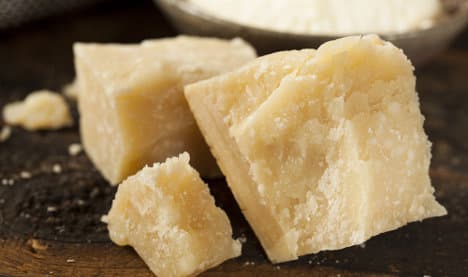How the grate parmesan scam costs Italy millions

Online sales of rip-off parmesan cheese alone cost Italy €60 million last year, an employee at the Ministry of Food, Forestry and Agricuture told The Local.
There were 370 cases of fake parmesan sold online over the last 12 months, although Vincenzo Carrozzino, who works to combat fraud at the ministry, said Italian food fraud was so widespread it was difficult to estimate the real size of the problem.
The figures were revealed during a forum about Italian produce at Milan's Expo on Monday.
Over the years there have been some shocking examples of food fraud, but online agropiracy is a relatively new problem that is difficult to fight.
The ministry is now working alongside online marketplaces, including Ebay and Alibaba, to ensure counterfeit versions of Italian produce protected by EU food quality labels, such as DoP, IGP and STG, are not being sold on their platforms.
“It's already a difficult problem offline, but online is harder to combat," said Carrozzino.
"Sellers can work through nicknames and as soon as we signal the fraud and block it, they are back up on a different server under a different name."
Italy has the highest number of products (794) protected by EU food labels, which seek to guarantee their authenticity.
The production of these foods, including Italian wines, balsamic vinegar and cured meats, involves 300,000 businesses and is worth an estimated €13.5 billion a year, so the need to protect them is paramount.
In many ways Italian food is a victim of its own success. In today's global food culture, “Italian” has become a byword for quality. The downside to this it that there are plenty of retailers looking to make a quick buck from the strength of the 'Made in Italy' brand.
Dodgy names
Food fraud takes many forms, but one of the biggest problems facing Italian producers is the problem of Italian-sounding names.
How about some fine Romano cheese, some delicious 100 percent Italian-standard pasta, and a nice bottle of Rosecco to wash it all down with? It almost sounds tempting. Almost.
“Italian sounding names break EU rules on unfair competition because they give the consumer a false impression of the product”, Carrozzino added.
“But sometimes it's enough just to put the Italian flag on the box.”
Names, flags, Italian words. These are all good ways to dupe consumers into thinking they have bought the real thing, when in reality they are buying a product that has no connection to Italy, aside from its dubious name.
But how can shoppers be sure that they are buying quality?
“Consumers do have a responsibility to read the label carefully. Nowadays, there is so much information on labels and consumers really should read them properly,” said Carrozzino.
So be careful out there. Now, who's for some Rosecco? Anyone?
Comments
See Also
There were 370 cases of fake parmesan sold online over the last 12 months, although Vincenzo Carrozzino, who works to combat fraud at the ministry, said Italian food fraud was so widespread it was difficult to estimate the real size of the problem.
The figures were revealed during a forum about Italian produce at Milan's Expo on Monday.
Over the years there have been some shocking examples of food fraud, but online agropiracy is a relatively new problem that is difficult to fight.
The ministry is now working alongside online marketplaces, including Ebay and Alibaba, to ensure counterfeit versions of Italian produce protected by EU food quality labels, such as DoP, IGP and STG, are not being sold on their platforms.
“It's already a difficult problem offline, but online is harder to combat," said Carrozzino.
"Sellers can work through nicknames and as soon as we signal the fraud and block it, they are back up on a different server under a different name."
Italy has the highest number of products (794) protected by EU food labels, which seek to guarantee their authenticity.
The production of these foods, including Italian wines, balsamic vinegar and cured meats, involves 300,000 businesses and is worth an estimated €13.5 billion a year, so the need to protect them is paramount.
In many ways Italian food is a victim of its own success. In today's global food culture, “Italian” has become a byword for quality. The downside to this it that there are plenty of retailers looking to make a quick buck from the strength of the 'Made in Italy' brand.
Dodgy names
Food fraud takes many forms, but one of the biggest problems facing Italian producers is the problem of Italian-sounding names.
How about some fine Romano cheese, some delicious 100 percent Italian-standard pasta, and a nice bottle of Rosecco to wash it all down with? It almost sounds tempting. Almost.
“Italian sounding names break EU rules on unfair competition because they give the consumer a false impression of the product”, Carrozzino added.
“But sometimes it's enough just to put the Italian flag on the box.”
Names, flags, Italian words. These are all good ways to dupe consumers into thinking they have bought the real thing, when in reality they are buying a product that has no connection to Italy, aside from its dubious name.
But how can shoppers be sure that they are buying quality?
“Consumers do have a responsibility to read the label carefully. Nowadays, there is so much information on labels and consumers really should read them properly,” said Carrozzino.
So be careful out there. Now, who's for some Rosecco? Anyone?
Join the conversation in our comments section below. Share your own views and experience and if you have a question or suggestion for our journalists then email us at [email protected].
Please keep comments civil, constructive and on topic – and make sure to read our terms of use before getting involved.
Please log in here to leave a comment.